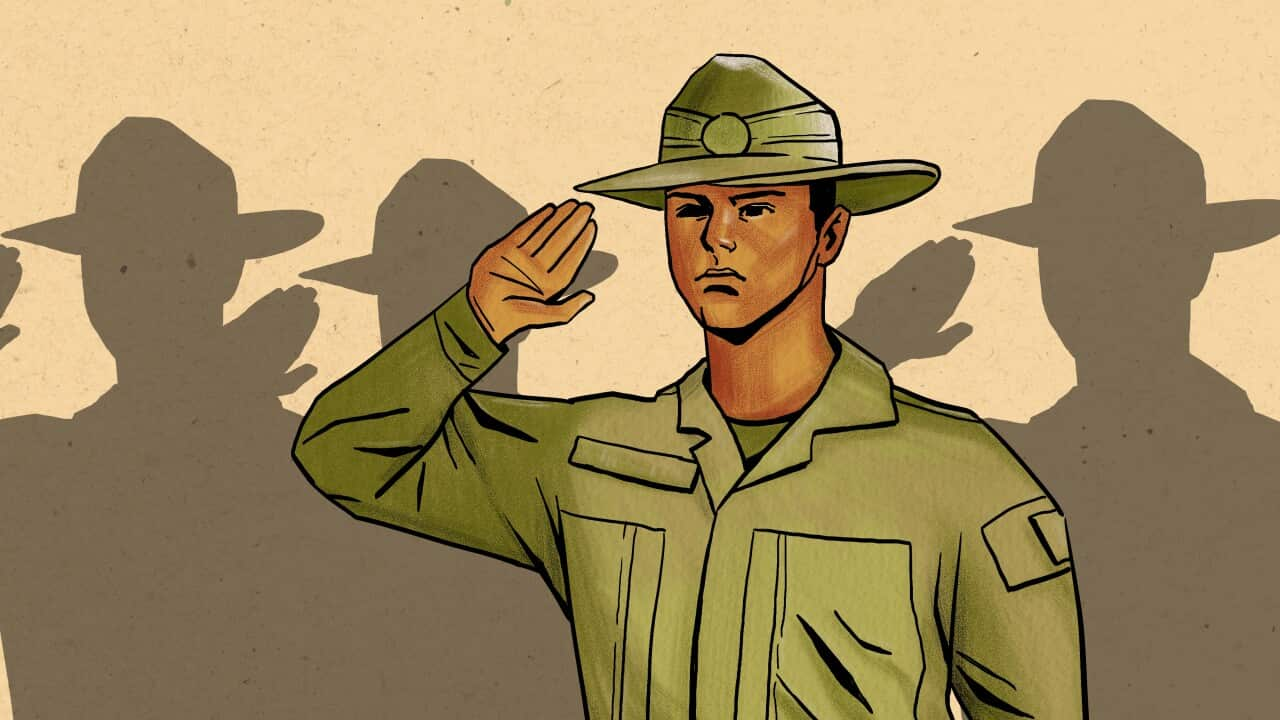Riley* was diagnosed with obsessive-compulsive disorder and anxiety at age 14, but he never thought it would affect his application to the Australian Defence Force (ADF) as an adult.
He had progressed successfully through the application process after graduating from school, until revealing to a recruitment psychologist that he had experienced mental health difficulties as a teenager.
As a result, Riley was deemed unfit to join the force — a decision he considers “an extreme overreaction” given he’d overcome his battles.
“Instead of deciding case-by-case which candidate is unfit or not, they automatically reject everyone [with a history of] mental health issues,” Riley said.
The ADF told The Feed that each applicant is assessed on mental health and psychological suitability, and that a mental health diagnosis is not considered automatic grounds for disqualification.
Riley’s application process took seven months and the long process caused him “financial stress”.
“I never thought it would take so long to do my army application, so I didn’t apply for other jobs,” he said.
A stringent application process
Riley’s mental health difficulties are common in Australia. According to the Australian Bureau of Statistics, two in five Australians will experience anxiety in their lifetime, while almost a third of Australians aged 16 and 25 experience anxiety disorders in a year.
But some ADF applicants avoid divulging details of their mental health disorders, The Feed has learned through conversations with serving members and applicants about their recruitment experiences.
To join the ADF, applicants choose their top three job preferences before attending a session that determines their suitability.
They also have to undergo a medical assessment, an ADF interview and a psychological interview.
The latter is what stops many applicants in their tracks.
ADF mental health standards not ‘fit for purpose’
Some current and former members question how the ADF can combat its recruitment crisis if it’s turning its back on a proportion of the population.
In February, ADF chief Angus Campbell told a parliamentary hearing there was a .
A Defence spokesperson told The Feed that the growth and retention of “a highly skilled Defence workforce is an immediate priority for the Australian Government.”
“But with that in mind, it’s important to also prioritise the wellbeing of our personnel.”
Robert Hoffmann is a professor of behavioural economics from the University of Tasmania and has published extensive research on ADF recruitment.
Hoffman believes the ADF’s recruitment mental health standards are no longer “fit for purpose”.
“The mental health landscape has changed … the regulations probably need to be looked at again now [that] people have different mental health issues than they did previously,” he said.
Ben Wadham, a professor of sociology with a speciality in defence and veteran studies at Flinders University said mental health challenges don’t necessarily make people more vulnerable.
“In fact, in the research we’ve done, people that have had some of those challenges … can become more resilient,” Wadham said.
Researcher Robert Hoffmann says young people are more wary of the tragedy of war — with raw footage readily available online. Source: AAP / Hassan Ammar/AP
Hoffmann added that for the first time in history, young people can now access footage and media of on-the-ground fighting through social media, which may increase levels of distress and anxiety among applicants.
“These guys are now coming to the military and they probably feel a little bit wary about what service might be like in terms of the mental health outcomes.”
Clinical psychologist Danielle Einstein told The Feed over email that anxiety is more “feared” in the community generally.
“However, it is hard to know whether concerns about anxiety have driven a reduction in army recruitment for Gen Z – or whether the drop has been driven by a change in Gen Z values played out through social media,” Einstein said.
The ADF told The Feed its entry medical and psychological standards are “in accordance with global best practice”.
“ADF candidates with a history of mental health or psychological issues are required to disclose their medical history during the application process for functional assessment. However, a self-identified mental health issue, a formal diagnosis, or a non-diagnosed history of mental health issues are not automatic grounds for preclusion,” it said in a statement.
The ADF said that psychologists share a duty of care to ensure that applicants “identified as high risk for service do not proceed to enlistment, for wellbeing and welfare of that individual”.
It added that the force was “making considerable investment to increase the volume and velocity of candidates in the recruiting pipeline and improve the overall ADF candidate experience”.
These guys coming to the military probably feel a little bit wary about what service might be like.
Professor Robert Hoffman
‘Leaving quality kids behind’
Drew*, in his 30s, has served in the ADF for four years and said he believes, from his experience, that the ADF uses “a blanket disqualification for the incredibly broad spectrum [that] ranges from people actually not suitable for service — or people that have had a rough time”.
The ADF has indicated it does not use blanket disqualifications.
Drew said a test that assesses how recruits deal with stressful situations could provide a solution.
“We need to grow our military, but we are leaving quality kids that are keen to serve behind.”
“That same kid in the 90s would have just been [labelled] a handful,” Drew said.
John*, 28, who will join the ADF this year, said applicants can face hurdles by revealing mental or physical health conditions, which may lead some to omit personal details.
“If you really want this job, sometimes you don’t want to bring up some minor condition, because it’s going to cause more hurdles during your application process,” John said.
The ADF will open up its doors to permanent residents from New Zealand, and eventually British, American and Canadian nationals who pass security checks from January 2025. Source: AAP / CPL Brodie Cross/AP
When the ADF deemed Riley permanently unfit, he had to appeal the decision, further bogging down his process.
“I had to obtain medical documents and specialist reports which took time, money and effort. It put a huge burden of stress on me mentally,” he said.
Some members told The Feed they faced several years of waiting while others reported being accepted within a couple of months.
What can the ADF do to appeal to young people?
The 2024 National Defence Strategy sets out a plan to “expand mental health and suicide prevention programs” and “streamline” the recruitment system to include a wider pool of applicants.
Hoffmann said the ADF needs to make itself appealing and accessible.
Recruitment ads overseas, like in Germany, make the military appear “sexy” for young people, he said.
“They’re very funky and exciting, really appealing to young people … You just need to appeal to a younger audience.”
In April, the federal government launched the National Defence Strategy, which will “expand mental health and suicide prevention programs”. Source: AAP / Lukas Coch
As the ADF — — eyes will be on how this impacts recruitment numbers.
For some people, the ADF can actually be a saviour, Hoffmann said.
“Recruits are not looking for a job, they’re looking for a calling. They’re really looking for somewhere to express themselves, to have a mission — to have a purpose in life.”
*To protect their identity, all interviewees’ names have been changed for this story.
Readers seeking support with mental health can contact Beyond Blue on 1300 22 4636. More information is available at .
supports people from culturally and linguistically diverse backgrounds.



